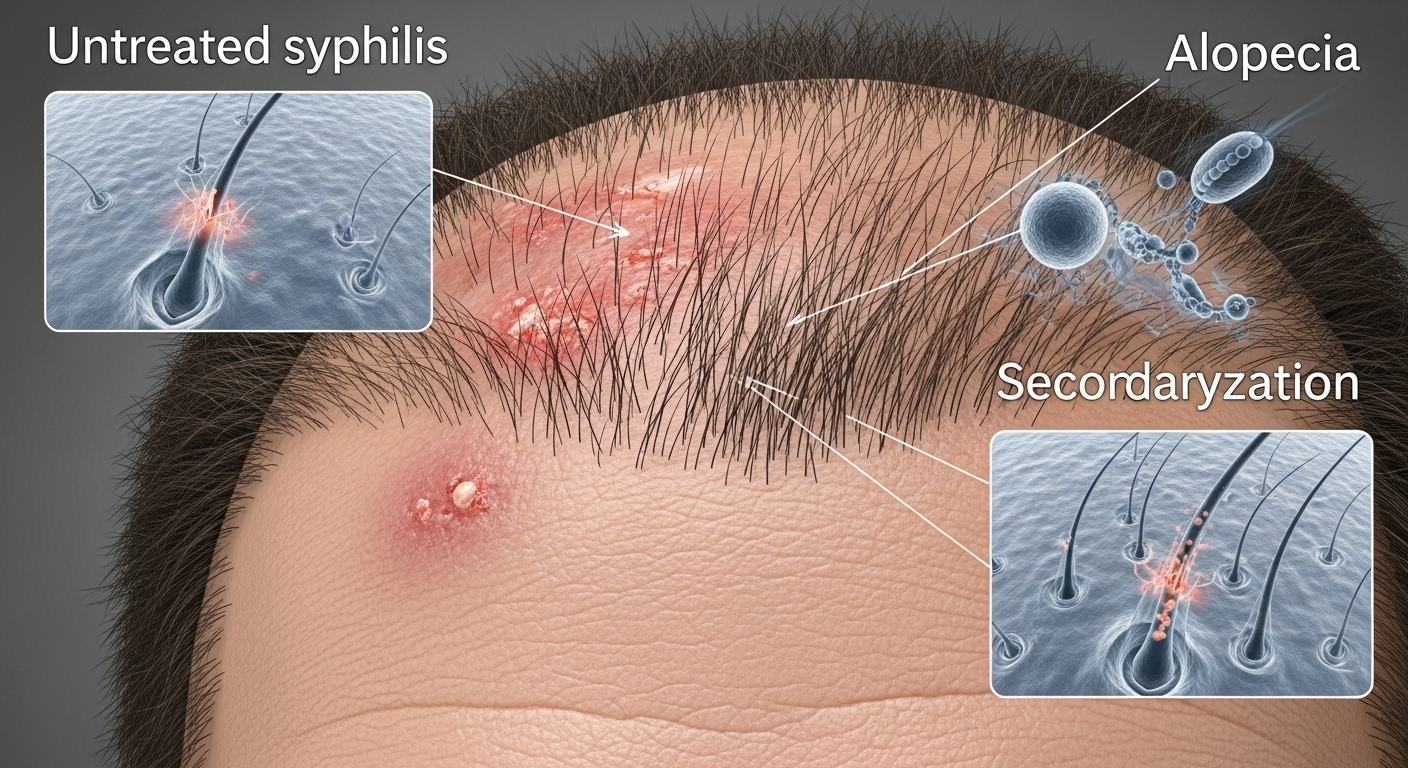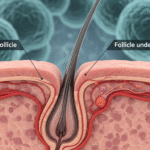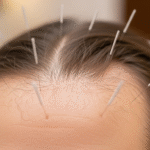Are you experiencing unexplained hair loss and wondering if an STD could be the cause? Can an STD cause hair loss is a common concern for many. While hair loss is not a typical symptom of most STDs, certain infections like syphilis and pubic lice have been linked to hair thinning. This article explores the …
Are you experiencing unexplained hair loss and wondering if an STD could be the cause? Can an STD cause hair loss is a common concern for many. While hair loss is not a typical symptom of most STDs, certain infections like syphilis and pubic lice have been linked to hair thinning.
This article explores the connection between STDs and hair loss, the underlying causes, and treatment options to help you understand the issue and find solutions.
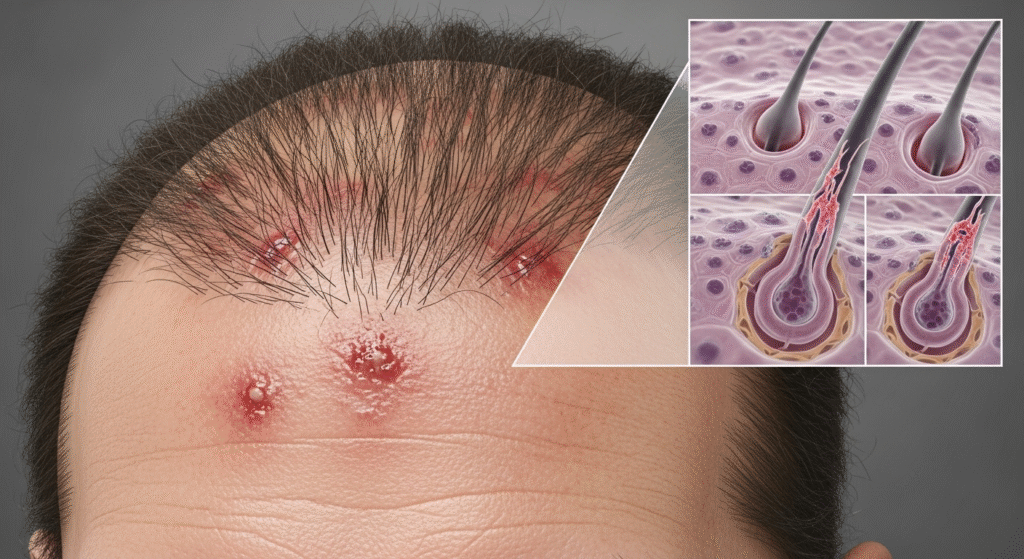
Which STDs Are Linked to Hair Loss?
Syphilis and Syphilitic Alopecia
One of the STDs most commonly associated with hair loss is syphilis, particularly in its secondary stage. Syphilitic alopecia is a condition where individuals experience patchy hair loss, often described as “moth-eaten” alopecia.
This type of hair loss occurs due to the systemic infection of syphilis and is seen in about 3–7% of individuals with secondary syphilis. Early diagnosis and treatment of syphilis with antibiotics, such as penicillin, can reverse the hair loss once the infection is managed.
Pubic Lice (Crabs)
Pubic lice, or crabs, can lead to localized hair loss due to the intense itching caused by the lice infestation. Though pubic lice does not directly cause permanent hair loss, repeated scratching can damage the hair follicles and lead to temporary thinning. Treatment for pubic lice typically includes topical medications or medicated shampoos to eradicate the lice and relieve symptoms.
HIV and Antiretroviral Therapy
While HIV itself doesn’t directly cause hair loss, antiretroviral medications (ARVs), commonly used in HIV treatment, have been known to cause hair thinning or telogen effluvium (a condition where hair follicles enter the shedding phase prematurely).
The stress on the body caused by both the HIV infection and the medications can contribute to hair loss. For those experiencing this side effect, consulting with a healthcare provider can help adjust treatment to minimize hair thinning.
Trichomoniasis
Trichomoniasis, caused by the parasite Trichomonas vaginalis, can result in inflammation and irritation in the genital area. While hair loss is not a direct symptom, scratching or discomfort from the infection may lead to temporary hair thinning. Effective treatment with antibiotics can address the infection and prevent further hair loss.
How Can an STD Cause Hair Loss?
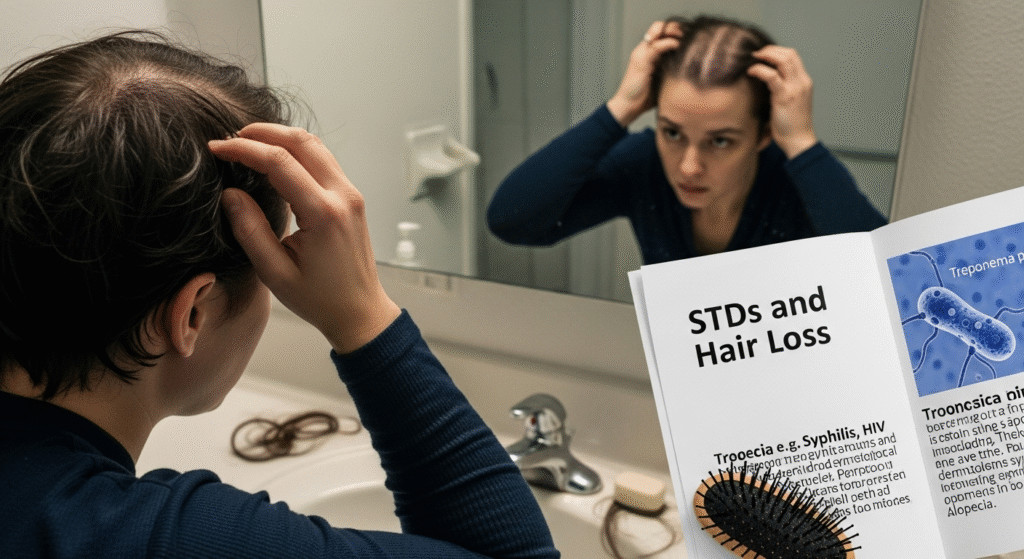
Immune Response and Inflammation
When the body is fighting an infection like an STD, it can trigger a strong immune response. This immune reaction often leads to systemic inflammation, which can disrupt the normal hair growth cycle. The inflammation caused by the infection can prevent hair follicles from entering the growth phase, resulting in shedding and thinning of the hair.
Nutrient Deficiencies
Some STDs and their treatments can lead to deficiencies in vital nutrients necessary for healthy hair growth. Iron, vitamin B, and zinc deficiencies are common in individuals with untreated or chronic STDs. These deficiencies can contribute to weakened hair and eventual hair loss. Nutritional supplementation, along with proper medical treatment for the STD, is crucial for restoring hair health.
Stress and Hormonal Imbalances
Being diagnosed with an STD can be emotionally and physically stressful. Stress is one of the leading causes of telogen effluvium, a condition in which hair sheds excessively.
Additionally, the hormonal imbalances that often accompany stress can further affect hair growth. The stress of managing an STD, coupled with its physical symptoms, can therefore contribute significantly to hair thinning.
Diagnosing Hair Loss Related to STDs
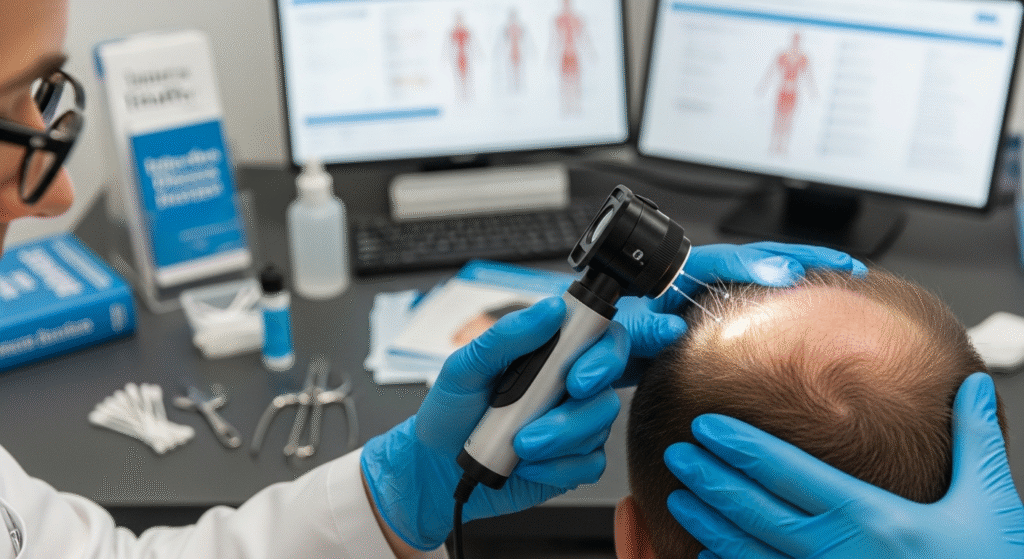
Medical Evaluation
If you’re noticing significant hair loss and suspect it may be related to an STD, a visit to a healthcare provider is essential. Your doctor will conduct a thorough physical examination and review your medical history to determine the cause of the hair loss. They may also perform tests to check for STDs, other infections, or underlying health conditions.
Laboratory Tests
To pinpoint the exact cause of your hair loss, your doctor may recommend blood tests or even a scalp biopsy. Blood tests can reveal if an infection is present, while a scalp biopsy may help determine if inflammation or other factors are contributing to the hair thinning.
Treatment Options for Hair Loss Due to STDs
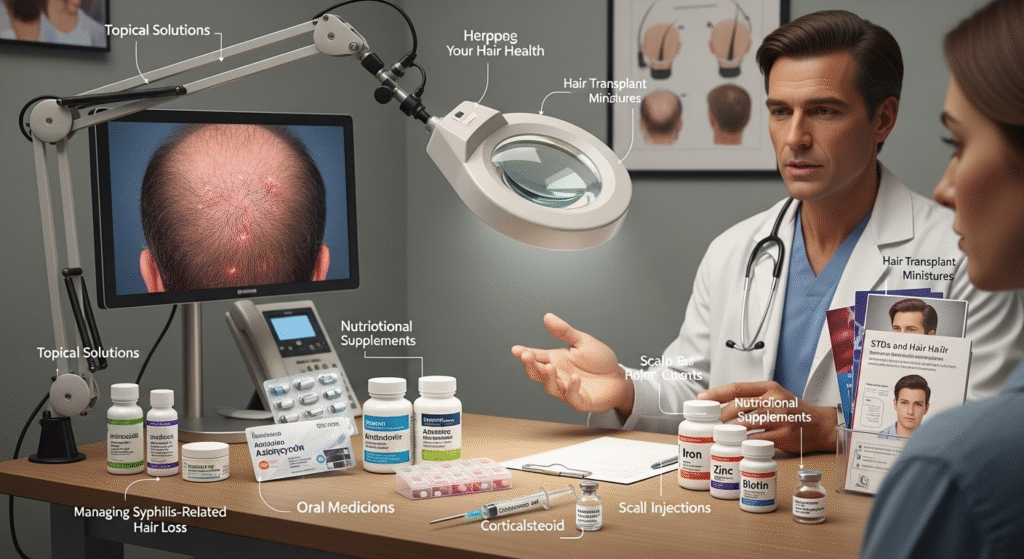
Addressing the Underlying Infection
The most effective treatment for hair loss related to STDs is to address the underlying infection. For instance, syphilis can be treated with antibiotics like penicillin, while pubic lice can be eradicated with topical medications. Once the infection is treated, hair loss caused by these conditions may reverse itself, and hair growth may resume.
Nutritional Support
Since some STDs and their treatments can lead to nutrient deficiencies, nutritional support is vital for supporting hair regrowth. Taking iron, B-complex vitamins, and other essential nutrients can help improve hair health. Consult with your healthcare provider about adding supplements to your routine if you are experiencing hair thinning.
Stress Management
Managing stress is crucial for preventing hair loss due to hormonal imbalances. Engaging in activities like yoga, meditation, and exercise can significantly reduce stress levels and promote hair regrowth. Adequate sleep and a healthy diet also play important roles in maintaining hair health.
Preventing Hair Loss Associated with STDs
Practice Safe Sex
One of the most effective ways to prevent hair loss linked to STDs is to practice safe sex. Using condoms and dental dams can reduce the risk of contracting STDs, thereby lowering the chances of experiencing hair loss associated with these infections.
Regular Screenings
Routine STD testing is essential for early detection and treatment of infections. Early diagnosis can help prevent complications like hair loss from escalating. Regular screenings are particularly important for those with multiple sexual partners or those experiencing symptoms of an STD.
Maintain a Healthy Diet
A well-balanced diet rich in vitamins and minerals supports overall health, including hair health. Nutrient-dense foods such as leafy greens, nuts, seeds, and fish provide essential nutrients that promote hair growth and prevent thinning.
Manage Stress
Incorporating stress management techniques like deep breathing, exercise, and journaling can help regulate hormones and maintain hair health. Reducing stress helps to manage conditions like telogen effluvium and ensures that your hair growth cycle remains intact.
FAQs
Can All STDs Cause Hair Loss?
No, only certain STDs like syphilis and pubic lice are known to be linked to hair loss. However, the stress and treatment associated with other STDs, like HIV, can also contribute to hair thinning.
Is Hair Loss From STDs Permanent?
Hair loss caused by STDs is typically not permanent. Once the underlying infection is treated, hair may begin to regrow. However, this depends on the severity of the infection and how quickly treatment is administered.
How Soon After Treatment Will Hair Regrow?
Hair regrowth can begin within 3 to 6 months after effective treatment of the underlying infection. However, the full regrowth process may take longer, depending on individual factors such as age, overall health, and the extent of hair loss.
Conclusion
While hair loss due to an STD is not common, certain infections like syphilis and pubic lice can lead to hair thinning or loss. Early diagnosis and treatment are key to reversing the effects of these infections on hair health. If you’re experiencing unexplained hair loss, consult a healthcare provider for an accurate diagnosis and effective treatment plan.
Book a Consultation Today
If you’re concerned about hair loss and its potential link to an STD, schedule a consultation with Dr. Uzma Irfan, an ISHRS-certified surgeon in Islamabad today. Early intervention can help restore your hair and peace of mind.

